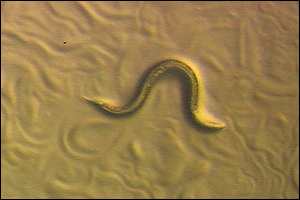
New anti-ageing insight
URL: http://news.bbc.co.uk/hi/english/sci/tech/newsid_1207000/1207401.stmDate accessed: 15 March 2001
Wednesday, 7 March, 2001, 19:06 GMT

The tiny roundworms survived up to 50% longer when given an "anti-ageing" gene from yeast, according to research carried out at the Massachusetts Institute of Technology (MIT), US.
The team is already trying to alter the genetic makeup of mice to see whether similar genes might control ageing in more advanced animals.
The work could yield genetic clues to human ageing and speed the search for anti-ageing drugs.
The tiny creatures, a type of nematode worm, were given extra copies of a specific yeast gene known as SIR2. Yeast with two copies of this gene live longer than normal, while those lacking the gene have a shorter life span.
Yeast and worms
The scientists were able to extend the lifespan of worms from about two weeks up to three, by giving them a piece of artificial DNA containing the yeast gene.
At the very least, it seems that some genetic determinants of
longevity and ageing are conserved across animal groups
|
|
David Gems, University College London
|
"The worms with the extra section containing the SIR2 gene lived extraordinarily long," he added.
The finding is surprising given that even the humble worm is much more complex than single-celled yeast. The researchers believe that similar genes could be linked to ageing in all organisms, including humans.
"What's true in yeast and worms is probably generally true in all organisms, because these (two) organisms are so divergent," said Dr Guarente.
Genetic clue
The MIT team is already experimenting with the genetic makeup of mice to study ageing.
However mice, like humans, have seven similar equivalent genes and the same process could involve one or all or a combination of them.
Some experts believe that the research, reported in the journal Nature, could yield clues to human ageing.
"At the very least, it seems that some genetic determinants of longevity and ageing are conserved across animal groups - a fact that will encourage those studying ageing in model organisms," said David Gems of University College, London, UK, in a Nature commentary.
Category: 38. Medical and Pharmaceutical Innovation